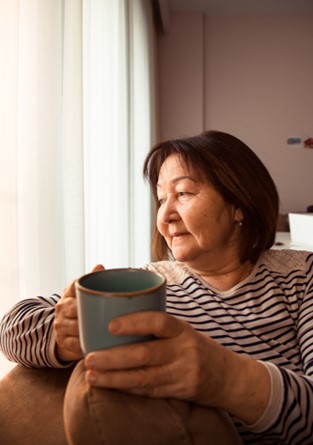The cost of living for Australians is a growing concern and older Australians have not been immune to the financial pressure of ever increasing cost of living pressures. According to the SOTON 2023 report, people’s feelings about their long-term financial security have dropped significantly amidst the cost of living crisis – 52% feel at least quite secure that their finances will be able to meet their needs throughout the rest of their life (rating this a 7 or more out of 10), down from 55% in 2021 [1].
Rising prices, particularly in essential goods and services, accommodation pressures coupled with limited income growth have contributed to the cost of living crisis faced by many older Australians.
Housing
Housing costs, including rent and property prices, have increased significantly in many parts of Australia. This has led to financial strain for older Australians, particularly those who are renting or still paying off mortgages. The statistics presented in the latest SOTON report are concerning. Over 1 in 5 (22%) Older Australians surveyed are renting, with many vulnerable groups significantly more likely. Renters were significantly less likely to be satisfied with not only their living arrangements, but also their ability to afford the home in which they live and keep up with bills. Furthermore, over 2 in 3 (67%) of those worried about their risk of homelessness are renters [2].about their risk of homelessness are renters
Healthcare
The cost of healthcare, including medical services, medications, and health insurance premiums, have been rising steadily. Older Australians often require more frequent medical attention and medications, leading to increased healthcare expenses. The SOTON report outlined that significantly more Older Australians are now finding it more difficult to access medical services with more than one in five now rating their level of difficulty as high (7 or more out of 10). Unfortunately, the SOTON report extends this further to note that this difficulty to access medical services is more commonly experienced by those financially vulnerable, including those who say their primary source of income is the carer’s allowance (54%), those who have experienced the loss of their spouse/partner in the last 12 months (49%), and those who worry about their risk of homelessness in the next 12 months (42%) [3].
Utility bills
The cost of utilities such as electricity, gas, and water have all been increasing. As of July 1, the Australian Energy Regulator (AER) confirmed that electricity prices would increase by between 20 and 25 per cent from July 1 in NSW — higher than the draft offer put forward by the regulator in March. These increases put additional pressure on already hurting Older Australians.
According to the SOTON 2023 report, one in five older Australians (18%) have overdue bills due to payment difficulties, and overdue electricity or gas bills are most common (11% have these overdue). The rates of Older Australians having overdue electricity or gas bills has increased wave on wave as Australia now battles an energy crisis.
Many Older Australians are eligible for government support in paying their energy bills through concessions. If you have a Commonwealth concession card (such as a Centrelink Pensioner Concession Card, a Centrelink HealthCare Card or Veterans’ Affairs Gold Card) and have your name on an electricity or gas bill then you may be eligible for a government concession. We suggest contacting your energy provider today or for more information contact the National Debt Helpline on 1800 007 007 or click here.
Consumer goods and services
Prices for consumer goods and services, such as groceries, transportation, and leisure activities, have also been on the rise. These increases can have a significant impact on older Australians, particularly those living on fixed incomes. Accordingly to the Australian Bureau of Statistics, across the past twelve months the living cost index (LCI) rose by 7.1% for self funded retirees and 7.2% for age pensioners [4]. Illustrating how the cost of living crisis has extended beyond housing and energy to getting food on the table.

Need help?
Call us on 1800 449 102 and we can provide you with Information and Guidance on where to go and who to call for help.
Contact the National Debt Helpline on 1800 007 007 or go to ndh.org.au.
Get Involved
Here at COTA NSW we are building a movement to support the positive ageing of Older Australians. We encourage you to get involved.
Join: Become a member of COTA NSW now. Our membership base gives us access to
people and communities enabling us to amplify the diverse voices across NSW
Voice: COTA NSW wants to hear from you and hear your experiences. Complete our 50+ survey >>
References:
[1] [2] [3] [5] SEC Newgate Research (2023) State of the Older Nation, prepared for the Councils on the Ageing Federation. COTA Australia
[4] Australian Bureau of Statistics (March 2023), Selected Living Cost Indexes, Australia, ABS Website, accessed 12 July 2023.
